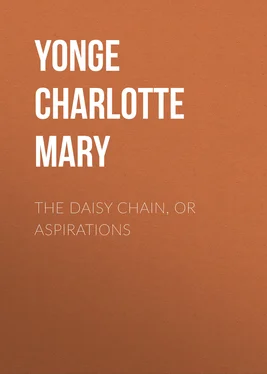Charlotte Yonge - The Daisy Chain, or Aspirations
Здесь есть возможность читать онлайн «Charlotte Yonge - The Daisy Chain, or Aspirations» — ознакомительный отрывок электронной книги совершенно бесплатно, а после прочтения отрывка купить полную версию. В некоторых случаях можно слушать аудио, скачать через торрент в формате fb2 и присутствует краткое содержание. Жанр: foreign_prose, literature_19, Европейская старинная литература, foreign_antique, на английском языке. Описание произведения, (предисловие) а так же отзывы посетителей доступны на портале библиотеки ЛибКат.
- Название:The Daisy Chain, or Aspirations
- Автор:
- Жанр:
- Год:неизвестен
- ISBN:нет данных
- Рейтинг книги:5 / 5. Голосов: 1
-
Избранное:Добавить в избранное
- Отзывы:
-
Ваша оценка:
- 100
- 1
- 2
- 3
- 4
- 5
The Daisy Chain, or Aspirations: краткое содержание, описание и аннотация
Предлагаем к чтению аннотацию, описание, краткое содержание или предисловие (зависит от того, что написал сам автор книги «The Daisy Chain, or Aspirations»). Если вы не нашли необходимую информацию о книге — напишите в комментариях, мы постараемся отыскать её.
The Daisy Chain, or Aspirations — читать онлайн ознакомительный отрывок
Ниже представлен текст книги, разбитый по страницам. Система сохранения места последней прочитанной страницы, позволяет с удобством читать онлайн бесплатно книгу «The Daisy Chain, or Aspirations», без необходимости каждый раз заново искать на чём Вы остановились. Поставьте закладку, и сможете в любой момент перейти на страницу, на которой закончили чтение.
Интервал:
Закладка:
He went into the cottage, and soon returned, saying, “Fine new blankets, and a great kettle of soup, and such praises of the ladies at the Grange!” And, at the next house, it was the same story. “Well, ‘tis no mockery now to tell the poor creatures they want nourishing food. Slices of meat and bottles of port wine rain down on Abbotstoke.”
A far more talkative journey than usual ensued; the discussion of the paintings and antiques was almost equally delightful to the father and son, and lasted till, about a mile from Stoneborough, they descried three figures in the twilight.
“Ha! How are you, Wilmot? So you braved the rain, Ethel. Jump in,” called the doctor, as Norman drew up.
“I shall crowd you—I shall hurt your arm, papa; thank you.”
“No, you won’t—jump in—there’s room for three thread-papers in one gig. Why, Wilmot, your brother has a very jewel of a squire! How did you fare?”
“Very well on the whole,” was Mr. Wllmot’s answer, while Ethel scrambled in, and tried to make herself small, an art in which she was not very successful; and Norman gave an exclamation of horrified warning, as she was about to step into the flower-basket; then she nearly tumbled out again in dismay, and was relieved to find herself safely wedged in, without having done any harm, while her father called out to Mr. Wilmot, as they started, “I say! You are coming back to tea with us.”
That cheerful tone, and the kindness to herself, were a refreshment and revival to Ethel, who was still sobered and shocked by her yesterday’s adventure, and by the sense of her father’s sorrowful displeasure. Expecting further to be scolded for getting in so awkwardly, she did not venture to volunteer anything, and even when he kindly said, “I hope you were prosperous in your expedition,” she only made answer, in a very grave voice, “Yes, papa, we have taken a very nice tidy room.”
“What do you pay for it?”
“Fourpence for each time.”
“Well, here’s for you,” said Dr. May. “It is only two guineas to-day; that banker at the Grange beguiled us of our time, but you had better close the bargain for him, Ethel—he will be a revenue for you, for this winter at least.”
“Oh, thank you, papa,” was all Ethel could say; overpowered by his kindness, and more repressed by what she felt so unmerited, than she would have been by coldness, she said few words, and preferred listening to Norman, who began to describe their adventures at the Grange.
All her eagerness revived, however, as she sprang out of the carriage, full of tidings for Margaret; and it was almost a race between her and Norman to get upstairs, and unfold their separate budgets.
Margaret’s lamp had just been lighted, when they made their entrance, Norman holding the flowers on high.
“Oh, how beautiful! how delicious! For me? Where did you get them?”
“From Abbotstoke Grange; Miss Rivers sent them to you.”
“How very kind! What a lovely geranium, and oh, that fern! I never saw anything so choice. How came she to think of me?”
“They asked me in because it rained, and she was making the prettiest things, leather leaves and flowers for picture frames. I thought it was work that would just suit you, and learned how to do it. That made them ask about you, and it ended by her sending you this nosegay.”
“How very kind everybody is! Well, Ethel, are you come home too?”
“Papa picked me up. Oh, Margaret, we have found such a nice room, a clean sanded kitchen—”
“You never saw such a conservatory—”
“And it is to be let to us for fourpence a time—”
“The house is full of beautiful things, pictures and statues. Only think of a real Titian, and a cast of the Apollo!”
“Twenty children to begin with, and Richard is going to make some forms.”
“Mr. Rivers is going to show me all his casts.”
“Oh, is he? But only think how lucky we were to find such a nice woman; Mr. Wilmot was so pleased with her.”
Norman found one story at a time was enough, and relinquished the field, contenting himself with silently helping Margaret to arrange the flowers, holding the basket for her, and pleased with her gestures of admiration. Ethel went on with her history. “The first place we thought of would not do at all; the woman said she would not take half-a-crown a week to have a lot of children stabbling about, as she called it; so we went to another house, and there was a very nice woman indeed, Mrs. Green, with one little boy, whom she wanted to send to school, only it is too far. She says she always goes to church at Fordholm because it is nearer, and she is quite willing to let us have the room. So we settled it, and next Friday we are to begin. Papa has given us two guineas, and that will pay for, let me see, a hundred and twenty-six times, and Mr. Wilmot is going to give us some books, and Ritchie will print some alphabets. We told a great many of the people, and they are so glad. Old Granny Hall said, ‘Well, I never!’ and told the girls they must be as good as gold now the gentlefolks was coming to teach them. Mr. Wilmot is coming with us every Friday as long as the holidays last.”
Ethel departed on her father’s coming in to ask Margaret if she would like to have a visit from Mr. Wilmot. She enjoyed this very much, and he sat there nearly an hour, talking of many matters, especially the Cocksmoor scheme, on which she was glad to hear his opinion at first hand.
“I am very glad you think well of it,” she said. “It is most desirable that something should be done for those poor people, and Richard would never act rashly; but I have longed for advice whether it was right to promote Ethel’s undertaking. I suppose Richard told you how bent on it she was, long before papa was told of it.”
“He said it was her great wish, and had been so for a long time past.”
Margaret, in words more adequate to express the possession the project had gained of Ethel’s ardent mind, explained the whole history of it. “I do believe she looks on it as a sort of call,” said she, “and I have felt as if I ought not to hinder her, and yet I did not know whether it was right, at her age, to let her undertake so much.”
“I understand,” said Mr. Wilmot, “but, from what I have seen of Ethel, I should think you had decided rightly. There seems to me to be such a spirit of energy in her, that if she does not act, she will either speculate and theorise, or pine and prey on herself. I do believe that hard homely work, such as this school-keeping, is the best outlet for what might otherwise run to extravagance—more especially as you say the hope of it has already been an incentive to improvement in home duties.”
“That I am sure it has,” said Margaret.
“Moreover,” said Mr. Wilmot, “I think you were quite right in thinking that to interfere with such a design was unsafe. I do believe that a great deal of harm is done by prudent friends, who dread to let young people do anything out of the common way, and so force their aspirations to ferment and turn sour, for want of being put to use.”
“Still girls are told they ought to wait patiently, and not to be eager for self-imposed duties.”
“I am not saying that it is not the appointed discipline for the girls themselves,” said Mr. Wilmot. “If they would submit, and do their best, it would doubtless prove the most beneficial thing for them; but it is a trial in which they often fail, and I had rather not be in the place of such friends.”
“It is a great puzzle!” said Margaret, sighing.
“Ah! I dare say you are often perplexed,” said her friend kindly.
“Indeed I am. There are so many little details that I cannot be always teasing papa with, and yet which I do believe form the character more than the great events, and I never know whether I act for the best. And there are so many of us, so many duties, I cannot half attend to any. Lately, I have been giving up almost everything to keep this room quiet for Norman in the morning, because he was so much harassed and hurt by bustle and confusion, and I found to-day that things have gone wrong in consequence.”
Читать дальшеИнтервал:
Закладка:
Похожие книги на «The Daisy Chain, or Aspirations»
Представляем Вашему вниманию похожие книги на «The Daisy Chain, or Aspirations» списком для выбора. Мы отобрали схожую по названию и смыслу литературу в надежде предоставить читателям больше вариантов отыскать новые, интересные, ещё непрочитанные произведения.
Обсуждение, отзывы о книге «The Daisy Chain, or Aspirations» и просто собственные мнения читателей. Оставьте ваши комментарии, напишите, что Вы думаете о произведении, его смысле или главных героях. Укажите что конкретно понравилось, а что нет, и почему Вы так считаете.












